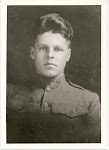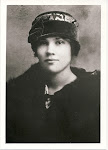This letter is one of a handful in which Roy discusses politics and expresses an opinion on the events of the war. It's an interesting departure from the usual commentary on weather and everyday life. Of course, the Peace Conference would have meant a great deal to any American but especially to a soldier stuck overseas and far from home.
My Dear Friend:
I want to tell you this evening of our move we made last Tuesday. We left Behonne but instead of moving toward a post, as all had hoped, we came the other way, so now we are up toward Metz. Still in France but only about three miles from the Alsace-Lorraine border near the town of Briey. We are located on an old Bosche flying field and will have, I think, quite a nice place when we get fixed up a little more. There were some buildings here but no sleeping quarters, so we tore down some German hospital barracks and moved them about a mile and set them up again. They are not very large so with two small stoves in them we can keep them fairly warm and when we get bunks made we shall be O.K. As yet we have been sleeping on the floor.
For a mess hall and kitchen we tore down and rebuilt an old building. I understand we are not a part of the Third Army or Army of Occupation so I guess our hopes of getting home early are spoiled. I had figured that if I got home by next Fourth of July I would be lucky but now since we are up here I am beginning to think that if I get back by July Fourth 1920 I shall be lucky. Oh well, as long as we stay over here we have one thing to look forward to, and that is our home coming. Am I right? Ha, Ha!
I suppose you are having plenty of snow and winter weather back there now, are you not? We are having a spell of cold weather now and I hope it keeps it up for I sure was tired of the rain and mud. The ground has been frozen since last Tuesday and this evening it is snowing a little. I suppose we will not be getting any mail up here for a while as it seems when an outfit moves the mail gets tied up for a time. I received the first instalment of the story and read it and am now anxiously awaiting the rest of the story. Oh and also the picture. I have not forgotten that you said you might send me one. So don't forget, please.
How is school going? Have they opened up again? I had a letter from Dad a week or so ago and he told me of the apples and good things to eat. They live on a farm, you know, and I told him he should not write me anything like that anymore as he would make me homesick. Ha. Ha!
We are about a mile and a half from Briey but I have not seen the town in daylight yet but it seems to be like all the other French towns. This part of the country is French but was held by the Germans since 1914. I was down at Briey one evening to see a show. Two y women and a Lieutenant and the 28th Division Band. The 28th division boys are Pennsylvanians. The 110th Infantry was stationed here until a few days before we moved here. The 110th was the 5th Regiment Pennsylvania National Guard. They moved back somewhere and are on their way to port and expect to go home soon.
What does this Peace Conference look like to you now? I remember you did not seem to think much of the U.S. delegates. I have not been getting any papers for a couple of weeks but it seems to me that almost or perhaps altogether as much depends on the present conference as on the outcome of the actual war. I am not much on politics and worse yet I have not been reading much but it seems to me that if ever there was a time for earnest, honest and united action on the part of all Americans it is now. The Germans are licked but they are not over causing trouble by any means. They are playing for sympathy now.
I do not know of much more to write. anyway I think I have scribbled about enough for this evening, so will close.
Most Sincerely yours,
Roy Sgt Roy J. Diehl.
281st Aero Squadron, Amer E.F. France


